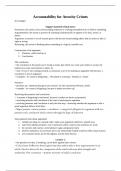Accountability for Atrocity Crimes
do readings!
Support material critical notes:
Persuasion: the action or fact of persuading someone or of being persuaded to do or believe something
Argumentation: the action or process of reasoning systematically in support of an idea, action, or
theory
Argument: a reasons or set of reasons given with the aim of persuading others that an action or idea is
right or wrong
Reasoning: the action of thinking about something in a logical, sensible way
Construction of an argument:
1. Premises, which lead up to
2. Conclusions
The conclusion
> the conclusion is the point you’re trying to make, that which you want your reader to accept, the
opinion you want your listener to share, etc
> note: if you’re not working towards a conclusion, you’re not making an argument. But beware: a
conclusion is not an argument
> examples: ‘ice cream is disgusting’ , ‘the planet is warming’, ‘Banksy is a fraud’
Premises
> premises are ‘statement that give your reasons’ for the conclusion (Weston, 2018)
> example: ‘ice cream is disgusting, because it makes me throw up’
Resolving the premises and conclusion
> ‘icecream is disgusting [conclusion], because it makes me throw up [premise]
> resolving premises and conclusion is the start of analysing an argument
> resolving premises and conclusion is only the first step – assessing whether the argument is aslo a
good argument follows from there
> Major premise + minor premise + conclusion → categorical syllogism (an argument with two
premises and a conclusion which connect through the logic of deduction
Some general rules about arguments
1. unfold your ideas in a natural order: make your argument unfold in a smooth way
2. start from reliable premises: your conclusion will be weak if your premises are weak
3. be concrete and concise: avoid abstract vague and general terms
4. build on substance, not overtone; don’t use emotionally loaded words but offer actual reasons
5. use consistent terms: go for the tightest, not the most flowery
Lecture 1:
> the question of what, if anything, can be done against these crimes
> Critical note: Reflection about logical steps that authors take in their argumentation in an
article. Need to dissect the key components of the article and assess their strengths and
weaknesses. Not a summary → premise necessary to build a conclusion
, > Premise: All men are mortal, Socrates is a man, so Socrates is mortal
> Premises or assumptions might be wrong: look at those when criticising or reflecting a pap →
major premise (men are mortal) and minor premise (socrates is man) and then conclusion
(socrates is mortal). → focus on the essence
> Final assignment: look for specific case to analyse (genocide case? or war crimes? both interesting).
- start with good question
- good theory and understanding of theory
- good primary and secondary evidence → use court documents instead of newspapers!!!
- analysis: combination of theory and evidence, how well do you paint the picture.
> make the papers interesting to read
1) human rights (and their violation) are omnipresent in our lives – critical to how we live with
other people
2) universality: irrespective of where we live. we feel empowered when our rights are respected,
and vulnerable when they are breached (also irrespective of whether everyone knows of the
existence of human rights or not)
→ thus, when we talk about human rights, we talk about real people, real perspectives,
READ: Universal Declaration of Human Rights
> Upholding rights requires lot of resources → also curtailing or depriving people of rights
→ constantly involved with human rights language without even realising it
Lecture 2:
three generations of rights
> civil and political rights (18th
century): right to vote, freedom of
speech
> social and economic rights (20th
century): right to education, right to
housing, etc
> collective rights – human rights as
an international concern (21st
century): right to economic
development, right to breath
unpolluted air, right to benefit from
world trade, etc
→ human rights in international
domain means there is no longer
only states, but also the recognition of the individual as a subject in international politics
Today:
Three modes of accountability?
individual criminal accountability?
transformation of sovereignty?




